- HOME
- SYMPOSIUM & SEMINAR
- 第130回IROASTセミナー開催のお知らせ The 130th IROAST Seminar
SYMPOSIUM & SEMINAR
(Report報告)The 130th IROAST Seminar was held 第130回IROASTセミナーが開催されました。
2024年10月24日、桑原 穣 助教(大学院先端科学研究部)が世話人となり、第130回IROASTセミナーが開催され、学内の教員及び学生が参加しました。
コネチカット大学(アメリカ)の萬井 知康先生 (IROAST客員准教授)が、「重原子フリー光酸化触媒開発のための設計戦略」と題して興味深い講演をおこないました。
On October 24, 2024, the 130th IROAST Seminar, organized by Associate Prof. Yutaka KUWAHARA (FAST*), was held. Faculty members and students on campus participated in the seminar. Dr. Tomoyasu Mani (IROAST Visiting Associate Professor), University of Connecticut (USA), gave an interesting lecture titled " Design Strategies for Developing Heavy-Atom-Free Photoredox Catalysts".
*FAST: Faculty of Advanced and Science and Technology, Kumamoto University
■Organizer|世話人
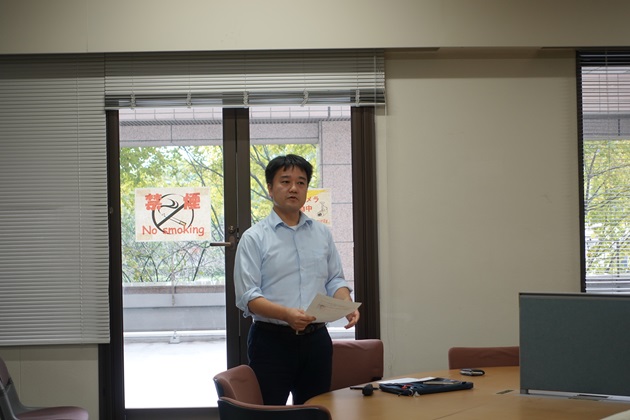
桑原 穣 助教(大学院先端科学研究部)
Assistant Prof. Yutaka KUWAHARA(FAST, Kumamoto University)
■Speaker|講演者
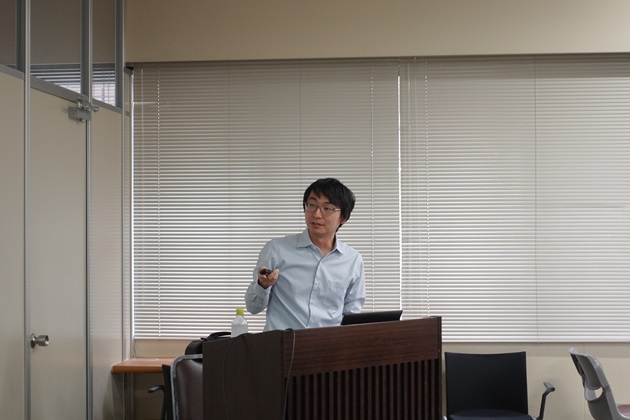
萬井 知康准教授(IROAST客員准教授)コネチカット大学(米国)
Associate Prof. Tomoyasu Mani (IROAST Visiting Associate Professor), University of Connecticut, USA
■At Venue|会場の様子
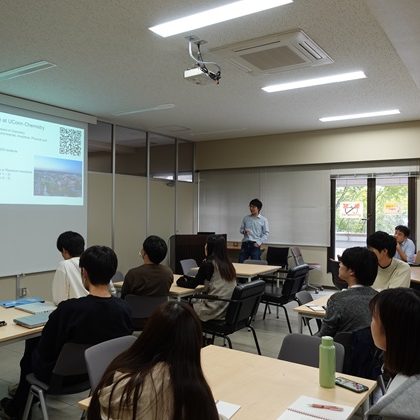
■Group Photo|集合写真
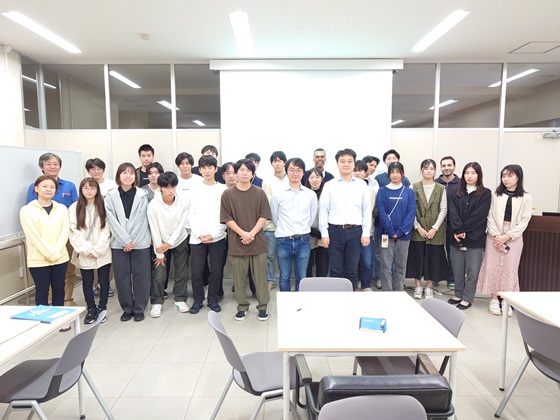
第130回IROASTセミナー開催のお知らせ The 130th IROAST Seminar
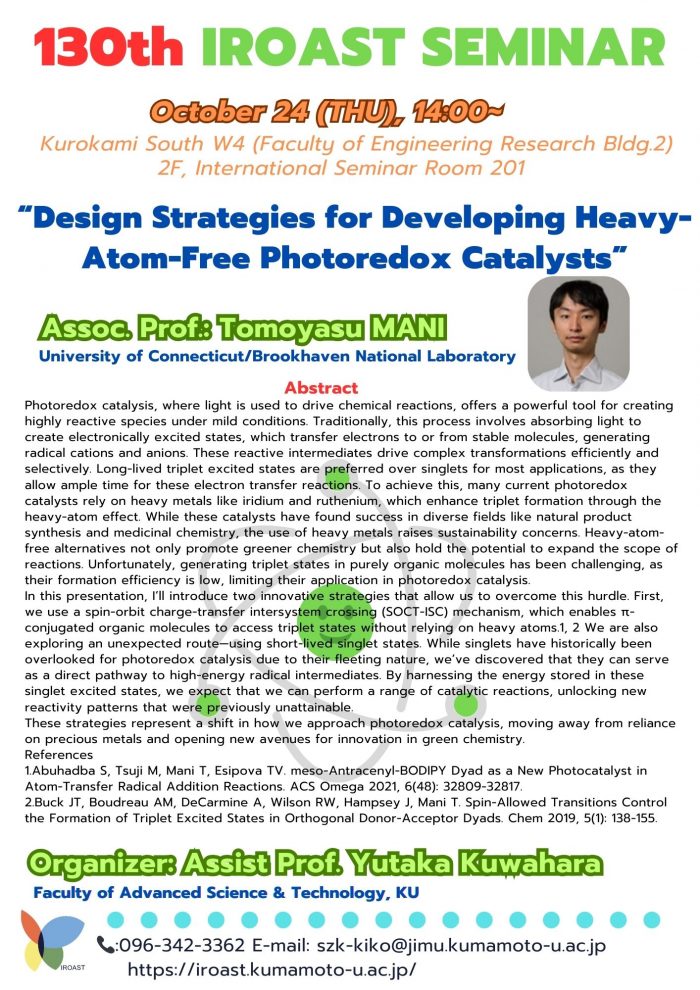
国際先端科学技術研究機構(IROAST)は、Tomoyasu Mani IROAST客員准教授による、第130回IROASTセミナーを下記のとおり開催いたします。
興味のある方はどなたでもご参加いただけます。多くの皆さまのご参加をお待ちしております。
本セミナーは英語にて行います。事前登録は不要です。
1.日 時:令和6年10月24日(木)14:00~
2.会 場:黒髪南地区 黒髪南W4(工学部研究棟2)2F国際セミナー室 (201号) 51番
3.講演者・タイトル (Speaker & Title):
Assoc. Prof. Tomoyasu Mani, University of Connecticut / Brookhaven National Laboratory, USA
“Design Strategies for Developing Heavy-Atom-Free Photoredox Catalysts”
4.概要(Abstract):
Photoredox catalysis, where light is used to drive chemical reactions, offers a powerful tool for creating highly reactive species under mild conditions. Traditionally, this process involves absorbing light to create electronically excited states, which transfer electrons to or from stable molecules, generating radical cations and anions. These reactive intermediates drive complex transformations efficiently and selectively. Long-lived triplet excited states are preferred over singlets for most applications, as they allow ample time for these electron transfer reactions. To achieve this, many current photoredox catalysts rely on heavy metals like iridium and ruthenium, which enhance triplet formation through the heavy-atom effect. While these catalysts have found success in diverse fields like natural product synthesis and medicinal chemistry, the use of heavy metals raises sustainability concerns. Heavy-atom-free alternatives not only promote greener chemistry but also hold the potential to expand the scope of reactions. Unfortunately, generating triplet states in purely organic molecules has been challenging, as their formation efficiency is low, limiting their application in photoredox catalysis.
In this presentation, I’ll introduce two innovative strategies that allow us to overcome this hurdle. First, we use a spin-orbit charge-transfer intersystem crossing (SOCT-ISC) mechanism, which enables π-conjugated organic molecules to access triplet states without relying on heavy atoms.1, 2 We are also exploring an unexpected route—using short-lived singlet states. While singlets have historically been overlooked for photoredox catalysis due to their fleeting nature, we’ve discovered that they can serve as a direct pathway to high-energy radical intermediates. By harnessing the energy stored in these singlet excited states, we expect that we can perform a range of catalytic reactions, unlocking new reactivity patterns that were previously unattainable.
These strategies represent a shift in how we approach photoredox catalysis, moving away from reliance on precious metals and opening new avenues for innovation in green chemistry.
References
- Abuhadba S, Tsuji M, Mani T, Esipova TV. meso-Antracenyl-BODIPY Dyad as a New Photocatalyst in Atom-Transfer Radical Addition Reactions. ACS Omega 2021, 6(48): 32809-32817.
- Buck JT, Boudreau AM, DeCarmine A, Wilson RW, Hampsey J, Mani T. Spin-Allowed Transitions Control the Formation of Triplet Excited States in Orthogonal Donor-Acceptor Dyads. Chem 2019, 5(1): 138-155.
5.世話人: 桑原 穣 助教(大学院先端科学研究部)
Email:kuwahara@kumamoto-u.ac.jp
【IROASTセミナーに関するお問合せ】
平川
Email: szk-kiko@jimu.kumamoto-u.ac.jp
--------------------------------------
IROAST will have the 130th IROAST Seminar by Assoc. Prof. Tomoyasu Mani, University of Connecticut/Brookhaven National Laboratory as follows.
Anyone interested in this seminar is more than welcome. Registration is not required.
We hope to see you at the seminar.
- Date and time: October 24 (Thurs.), 14:00~
- Venue: Kurokami South W4 (Faculty of Engineering Research Bldg.2): 2F, International Seminar Room 201
- Speaker, Title & Abstract: Referred to above
- Organizers: Assist. Prof. Yutaka Kuwahara (FAST, Kumamoto University)
E-mail: kuwahara@kumamoto-u.ac.jp - Remarks: This seminar will be held in English.
IROAST Seminar inquiries
Hirakawa (Ms.)
szk-kiko@jimu.kumamoto-u.ac.jp

